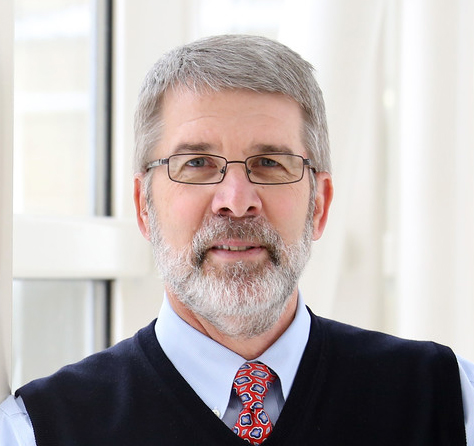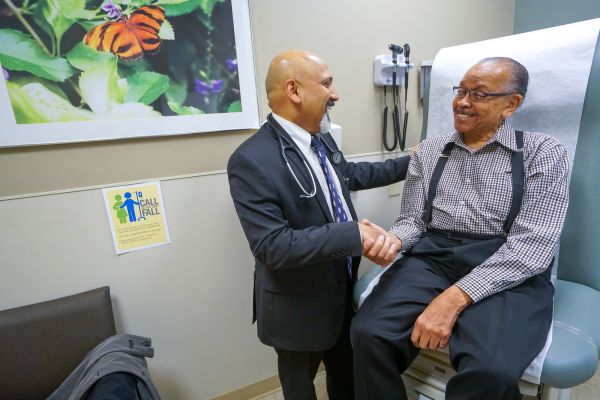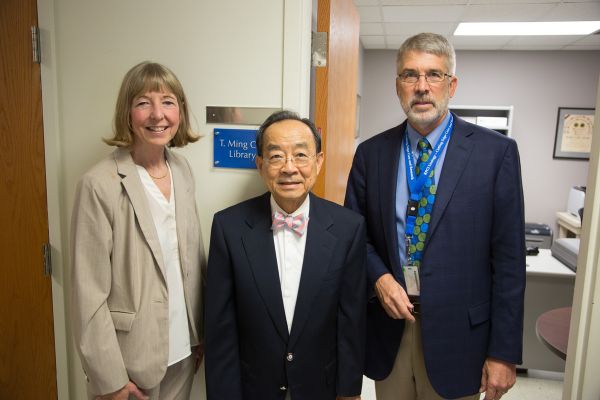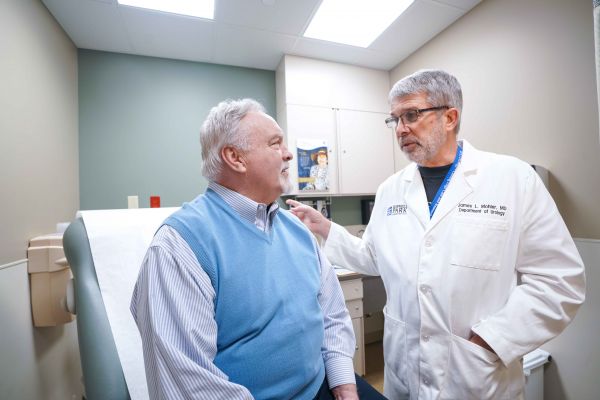Research Interests:
- Role of androgen receptor in the growth of prostate cancer
- Mechanism of prostate cancer recurrence during androgen deprivation therapy
- Racial differences in the androgen axis
- Active surveillance for low risk prostate cancer
Biography
James Mohler, MD, joined Roswell Park in 2003 as Chair of Urology and Leader of the Prostate Program. He became the Associate Director and Senior Vice President for Translational Research. He is Chair Emeritus, Urology, and Chief, Inter-Institutional Academics, and Professor of Oncology, at Roswell Park Comprehensive Cancer Center, and Adjunct Professor of Urology and Member of UNC-Lineberger Comprehensive Cancer Center at University of North Carolina.
Dr. Mohler earned his medical degree from the Medical College of Georgia and completed residency training in Surgery and Urology at the University of Kentucky Medical Center and was an American Urological Association Scholar(fellow) in Urologic Oncology at Johns Hopkins University School of Medicine.
Dr. Mohler is licensed by New York and North Carolina, a Diplomate of the National Board of Medical Examiners and the American Board of Urology, and a Fellow of the American College of Surgeons.
Dr. Mohler was Chair of the NCCN Prostate Cancer Treatment Panel from 2005 to 2020, and a member of the NCCN Prostate Cancer Early Detection Panel from 2003 to 2020. He is a member of the American Medical Association, American Association for the Advancement of Science, American Association for Cancer Research, American Urological Association and American College of Surgeons. He has received the following notable awards: Thomas Thomasi, MD, PhD Hope Award (2011); Society for Basic Urologic Research Distinguished Service Award (2012); NCCN Board of Producers Award (2014); Distinguished Scholar Alumnus of the American Urological Association (2015); and NCCN Rodger Winn Foundation Award (2017).
Dr. Mohler’s clinical practice focused on prostate cancer and robot-assisted laparoscopic surgery but he ended patient care 06/10/2020. He has been engaged in translational research for 35 years. His activities have focused upon the role for the androgen receptor in prostate cancer recurrence after androgen deprivation therapy and racial differences in prostate cancer aggressiveness. These research activities have been supported primarily by a Program Project that ended 03/31/2017 after 17 years, “Prostate Cancer: Transition to Androgen-Independence” and the DOD Prostate Cancer Research Program funded “North Carolina-Louisiana Prostate Cancer Project (PCaP),” the largest population-based prostate cancer study ever conducted (2258 men with newly diagnosed prostate cancer; involved 11 institutions). PCaP sought to compartmentalize the reasons for increased CaP mortality in African Americans. Thus far, racial differences in interaction between African-American prostate cancer patients and the American Healthcare System seem to outweigh the impact of racial differences in prostate cancer biology and host environment (diet) and genetics. PCaP has produced a total of 64 manuscripts thus far and 22 grants have been awarded to continue the interrogation of its data and biorepository. The P01 demonstrated that tissue levels of dihydrotestosterone in prostate cancer that recurs during androgen deprivation therapy are sufficient for androgen receptor activation, which lead to the re-purposing of abiraterone to treat castration-recurrent prostate cancer. His focus on androgen receptor and androgen deprivation therapy continues with a grant to develop a novel therapeutic against dihydrotestosterone production. His focus on racial disparities in prostate cancer continues with a grant to study financial distress. He has authored or co-authored 334 publications and 20 book chapters, and a book “Androgen Action in Prostate Cancer.” He serves on the editorial board of The Prostate, and reviews for several journals including Cancer, Cancer Research, Clinical Cancer Research, Journal of Molecular Endocrinology, European Urology, Journal of Urology, New England Journal of Medicine, and Nature Reviews Urology.
Positions
Roswell Park Comprehensive Cancer Center
- Professor of Oncology
- Chair, Emeritus – Department of Urology
Jacobs School of Medicine and Biomedical Sciences, University at Buffalo
- Professor of Urology
University of North Carolina at Chapel Hill
- Adjunct Professor of Urology
- Member, Lineberger Comprehensive Cancer Center
Background
Education and Training
- MD - Medical College of Georgia, Augusta, GA
Residency
- Surgery and Urology, University of Kentucky, Lexington, KY
- Internal Medicine, Duke University Medical Center, Durham, NC
Fellowship
- American Urological Association Scholar/Fellow - Urologic Oncology, Johns Hopkins University School of Medicine, Baltimore, MD
Board Certification
- Diplomate, National Board of Medical Examiners
- American Board of Urology
- Fellow, American College of Surgeons
Professional Memberships
- 2005-2020 - Chair, NCCN Prostate Cancer Treatment Panel
- 2003-2020 - Member, NCCN Prostate Cancer Early Detection Panel
- American Medical Association
- American Association for the Advancement of Science
- American Association for Cancer Research
- American Urological Association
- American College of Surgeons
Honors & Awards
- 2017 - NCCN Rodger Winn Foundation Award
- 2015 - Distinguished Scholar Alumnus of the American Urological Association
- 2014 - Appointment to the NCCN Board of Producers Award
- 2012 - Society for Basic Urologic Research Distinguished Service Award
- 2011 - Thomas Thomasi, MD, PhD Hope Award
Featured on CancerTalk
Showing all3 of 5 CollapseView all
Publications
Emam A, Hermann G, Attwood K, Ji W, James G, Kuettel M, Mohler JL. Oncologic outcome of radical prostatectomy versus radiotherapy as primary treatment for high and very high risk localized prostate cancer. Prostate 2021;81:223-230.
Eastham JA, Heller G, Halabi S, Monk JP 3rd, Beltran H, Gleave M, Evans CP, Clinton SK, Szmulewitz RZ, Coleman J, Hillman DW, Watt CR, George S, Sanda MG, Hahn OM, Taplin ME, Parsons JK, Mohler JL, Small EJ, Morris MJ. Cancer and Leukemia Group B 90203 (Alliance): Radical Prostatectomy With or Without Neoadjuvant Chemohormonal Therapy in Localized, High-Risk Prostate Cancer. J Clin Oncol 2020;38:3042-3050.
Mohler JL, Antonarakis ES, Armstrong AJ, D'Amico AV, Davis BJ, Dorff T, Eastham JA, Enke CA, Farrington TA, Higano CS, Horwitz EM, Hurwitz M, Ippolito JE, Kane CJ, Kuettel MR, Lang JM, McKenney J, Netto G, Penson DF, Plimack ER, Pow-Sang JM, Pugh TJ, Richey S, Roach M, Rosenfeld S, Schaeffer E, Shabsigh A, Small EJ, Spratt DE, Srinivas S, Tward J, Shead DA, Freedman-Cass DA. Prostate Cancer, Version 2.2019, NCCN Clinical Practice Guidelines in Oncology. J Natl Compr Canc Netw 2019;17:479-505.
Fiandalo MV, Stocking JJ, Pop EA, Wilton JH, Mantione KM, Li Y, Attwood KM, Azabdaftari G, Wu Y, Watt DS, Wilson EM, Mohler JL. Inhibition of dihydrotestosterone synthesis in prostate cancer by combined frontdoor and backdoor pathway blockade. Oncotarget 2018;9:11227-11242.
Mohler JL. Concept and viability of androgen annihilation for advanced prostate cancer. Cancer 2014;120:2628-37.
Mohler JL, Titus MA, Bai S, Kennerley BJ, Lih FB, Tomer KB, Wilson EM. Activation of the androgen receptor by intratumoral bioconversion of androstanediol to dihydrotestosterone in prostate cancer. Cancer Res 2011;71:1486-96.
Titus MA, Schell MJ, Lih FB, Tomer KB, Mohler JL. Testosterone and dihydrotestosterone tissue levels in recurrent prostate cancer. Clin Cancer Res 2005;11:4653-7.
Mohler JL, Gregory CW, Ford OH 3rd, Kim D, Weaver CM, Petrusz P, Wilson EM, French FS. The androgen axis in recurrent prostate cancer. Clin Cancer Res 2004;10:440-8.





